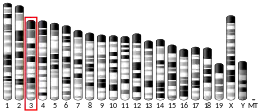MAGI3
Membrane-associated guanylate kinase, WW and PDZ domain-containing protein 3 is an enzyme that in humans is encoded by the MAGI3 gene.[5][6][7]
| MAGI3 | |||||||||||||||||||||||||||||||||||||||||||||||||||
|---|---|---|---|---|---|---|---|---|---|---|---|---|---|---|---|---|---|---|---|---|---|---|---|---|---|---|---|---|---|---|---|---|---|---|---|---|---|---|---|---|---|---|---|---|---|---|---|---|---|---|---|
| |||||||||||||||||||||||||||||||||||||||||||||||||||
| Identifiers | |||||||||||||||||||||||||||||||||||||||||||||||||||
| Aliases | MAGI3, MAGI-3, dJ730K3.2, membrane associated guanylate kinase, WW and PDZ domain containing 3 | ||||||||||||||||||||||||||||||||||||||||||||||||||
| External IDs | OMIM: 615943 MGI: 1923484 HomoloGene: 26431 GeneCards: MAGI3 | ||||||||||||||||||||||||||||||||||||||||||||||||||
| |||||||||||||||||||||||||||||||||||||||||||||||||||
| |||||||||||||||||||||||||||||||||||||||||||||||||||
| |||||||||||||||||||||||||||||||||||||||||||||||||||
| |||||||||||||||||||||||||||||||||||||||||||||||||||
| |||||||||||||||||||||||||||||||||||||||||||||||||||
| Wikidata | |||||||||||||||||||||||||||||||||||||||||||||||||||
| |||||||||||||||||||||||||||||||||||||||||||||||||||
References
- GRCh38: Ensembl release 89: ENSG00000081026 - Ensembl, May 2017
- GRCm38: Ensembl release 89: ENSMUSG00000052539 - Ensembl, May 2017
- "Human PubMed Reference:". National Center for Biotechnology Information, U.S. National Library of Medicine.
- "Mouse PubMed Reference:". National Center for Biotechnology Information, U.S. National Library of Medicine.
- Nagase T, Kikuno R, Nakayama M, Hirosawa M, Ohara O (Dec 2000). "Prediction of the coding sequences of unidentified human genes. XVIII. The complete sequences of 100 new cDNA clones from brain which code for large proteins in vitro". DNA Res. 7 (4): 273–81. doi:10.1093/dnares/7.4.271. PMID 10997877.
- Wu Y, Dowbenko D, Spencer S, Laura R, Lee J, Gu Q, Lasky LA (Aug 2000). "Interaction of the tumor suppressor PTEN/MMAC with a PDZ domain of MAGI3, a novel membrane-associated guanylate kinase". J Biol Chem. 275 (28): 21477–85. doi:10.1074/jbc.M909741199. PMID 10748157.
- "Entrez Gene: MAGI3 membrane associated guanylate kinase, WW and PDZ domain containing 3".
- Adamsky, Konstantin; Arnold Katya; Sabanay Helena; Peles Elior (Apr 2003). "Junctional protein MAGI-3 interacts with receptor tyrosine phosphatase beta (RPTP beta) and tyrosine-phosphorylated proteins". J. Cell Sci. 116 (Pt 7): 1279–89. doi:10.1242/jcs.00302. ISSN 0021-9533. PMID 12615970.
Further reading
- Zhang H, Wang D, Sun H, et al. (2007). "MAGI-3 regulates LPA-induced activation of Erk and RhoA". Cell. Signal. 19 (2): 261–8. doi:10.1016/j.cellsig.2006.06.008. PMC 1995035. PMID 16904289.
- He J, Bellini M, Inuzuka H, et al. (2006). "Proteomic analysis of beta1-adrenergic receptor interactions with PDZ scaffold proteins". J. Biol. Chem. 281 (5): 2820–7. doi:10.1074/jbc.M509503200. PMID 16316992.
- Franklin JL, Yoshiura K, Dempsey PJ, et al. (2005). "Identification of MAGI-3 as a transforming growth factor-alpha tail binding protein". Exp. Cell Res. 303 (2): 457–70. doi:10.1016/j.yexcr.2004.10.007. PMID 15652357.
- Yao R, Natsume Y, Noda T (2005). "MAGI-3 is involved in the regulation of the JNK signaling pathway as a scaffold protein for frizzled and Ltap". Oncogene. 23 (36): 6023–30. doi:10.1038/sj.onc.1207817. PMID 15195140.
- Ota T, Suzuki Y, Nishikawa T, et al. (2004). "Complete sequencing and characterization of 21,243 full-length human cDNAs". Nat. Genet. 36 (1): 40–5. doi:10.1038/ng1285. PMID 14702039.
- Adamsky K, Arnold K, Sabanay H, Peles E (2003). "Junctional protein MAGI-3 interacts with receptor tyrosine phosphatase beta (RPTP beta) and tyrosine-phosphorylated proteins". J. Cell Sci. 116 (Pt 7): 1279–89. doi:10.1242/jcs.00302. PMID 12615970.
- Strausberg RL, Feingold EA, Grouse LH, et al. (2003). "Generation and initial analysis of more than 15,000 full-length human and mouse cDNA sequences". Proc. Natl. Acad. Sci. U.S.A. 99 (26): 16899–903. Bibcode:2002PNAS...9916899M. doi:10.1073/pnas.242603899. PMC 139241. PMID 12477932.
- Nakayama M, Kikuno R, Ohara O (2003). "Protein-protein interactions between large proteins: two-hybrid screening using a functionally classified library composed of long cDNAs". Genome Res. 12 (11): 1773–84. doi:10.1101/gr.406902. PMC 187542. PMID 12421765.
- Thomas M, Laura R, Hepner K, et al. (2002). "Oncogenic human papillomavirus E6 proteins target the MAGI-2 and MAGI-3 proteins for degradation". Oncogene. 21 (33): 5088–96. doi:10.1038/sj.onc.1205668. PMID 12140759.
- Laura RP, Ross S, Koeppen H, Lasky LA (2002). "MAGI-1: a widely expressed, alternatively spliced tight junction protein". Exp. Cell Res. 275 (2): 155–70. doi:10.1006/excr.2002.5475. PMID 11969287.
This article is issued from Wikipedia. The text is licensed under Creative Commons - Attribution - Sharealike. Additional terms may apply for the media files.



